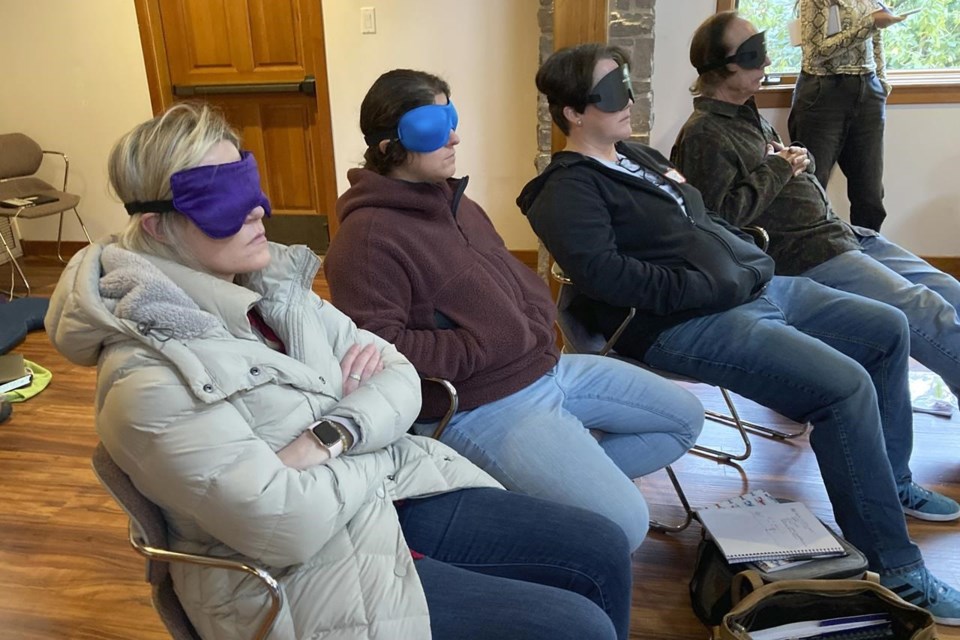SALEM, Ore. (AP) — Oregon was taking a major step Friday in its pioneering of legalized psilocybin therapy with the graduation of the first students trained in accompanying patients tripping on psychedelic mushrooms, although a company’s bankruptcy has left another group on the same path adrift.
The graduation ceremony for 35 students was being held Friday evening by InnerTrek, a Portland firm, at a woodsy retreat center. About 70 more will graduate on Saturday and Sunday in ceremonies in which they will pledge to do no harm.
“Facilitator training is at the heart of the nation’s first statewide psilocybin therapy and wellness program and is core to the success of the Oregon model we’re pioneering here," said Tom Eckert, program director at InnerTrek and architect of the 2020 ballot measure that legalized Oregon’s program.
The students must pass a final exam to receive InnerTrek certificates. They then take a test administered by the Oregon Health Authority to receive their facilitator licenses.
“The graduation of the first cohort of students from approved psilocybin facilitator training programs is a significant milestone for Oregon,” said Angie Allbee, manager of the state health authority’s psilocybin services section. “We congratulate Oregon’s future facilitators and the training programs they are graduating from on this incredible and historic moment in psilocybin history.”
The health authority reported Friday that so far it has received 191 license and worker permit applications, including licenses for manufacturers of psilocybin and service centers where the psychedelic substance would be consumed and experienced.
Allbee said she expects students will soon submit applications for licenses, “which will move us closer to service center doors opening in 2023.”
Some classes in InnerTrek's six-month, $7,900 course were held online, but others were in-person, held in a building near Portland resembling a mountain lodge.
The students were told that a dosing session at a licensed center should include a couch or mats for clients to sit or lie on, an eye mask, comfort items like a blanket and stuffed animals, a sketch pad, pencils and a bucket for vomiting. A session typically lasts at least six hours, often with music. Trainers emphasized that the facilitators' clients should be given the freedom to explore whatever emotions emerge during their inner journeys.
“We’re not guiding,” trainer Gina Gratza told the students in a December training session. “Let your participants’ experiences unfold. Use words sparingly. Let participants come to their own insights and conclusions.”
Researchers believe psilocybin changes the way the brain organizes itself, permitting users to adopt new attitudes more easily and help overcome depression, PTSD, alcoholism and other issues.
Eckert said the graduating students will be prepared to help clients see the benefits of psilocybin.
“I feel like it’s a big moment for our culture and country as we collectively begin to reexamine and reevaluate the nature of mental health and wellness, while bringing real healing to those in need,” he said.
Another facilitator training effort in southern Oregon has left students upset and a lawyer in the Netherlands trying to figure out what happened.
Synthesis Institute — a company based in the Netherlands that has over 200 students in Oregon, according to an article in Psychedelic Alpha — was declared bankrupt Tuesday, Dutch court documents showed. The company's website, which as of Friday had not been taken down, shows tuition being $12,997. The students are trying to get refunds.
“Synthesis really just has ripped the rug out from under us, for a lot of people,” one of the students, Cori Sue Morris, told Psychedelic Alpha.
Roos Suurmond, a lawyer in Amsterdam specializing in insolvency law, confirmed she has been appointed as a trustee to deal with the bankruptcy. She said in an interview she could not yet answer questions on the bankruptcy as she had so recently been appointed and still must investigate.
By February, the company’s liabilities totaled around $850,000, and it could not afford to pay its employees in the U.S. and the Netherlands, Psychedelic Alpha reported.
A real estate purchase in southern Oregon did not help matters.
An Oregon limited liability company, Oregon Retreat Centers LLC, was formed by Synthesis co-founder Myles Katz, Psychedelic Alpha reported. It purchased a 124-acre rustic retreat near Ashland, Oregon, in Jackson County for $3.6 million and planned to turn the site into a psilocybin service center, but a zoning problem developed.
While Oregon voters approved the measure on psilocybin in 2020, it did not make the drug legal until Jan. 1, 2023. The psilocybin sessions are expected to be available to the public in mid- or late-2023.
In November, Colorado voters also passed a ballot measure allowing regulated use of “magic mushrooms” starting in 2024.
___
Corder reported from The Hague, Netherlands.
Andrew Selsky And Mike Corder, The Associated Press



